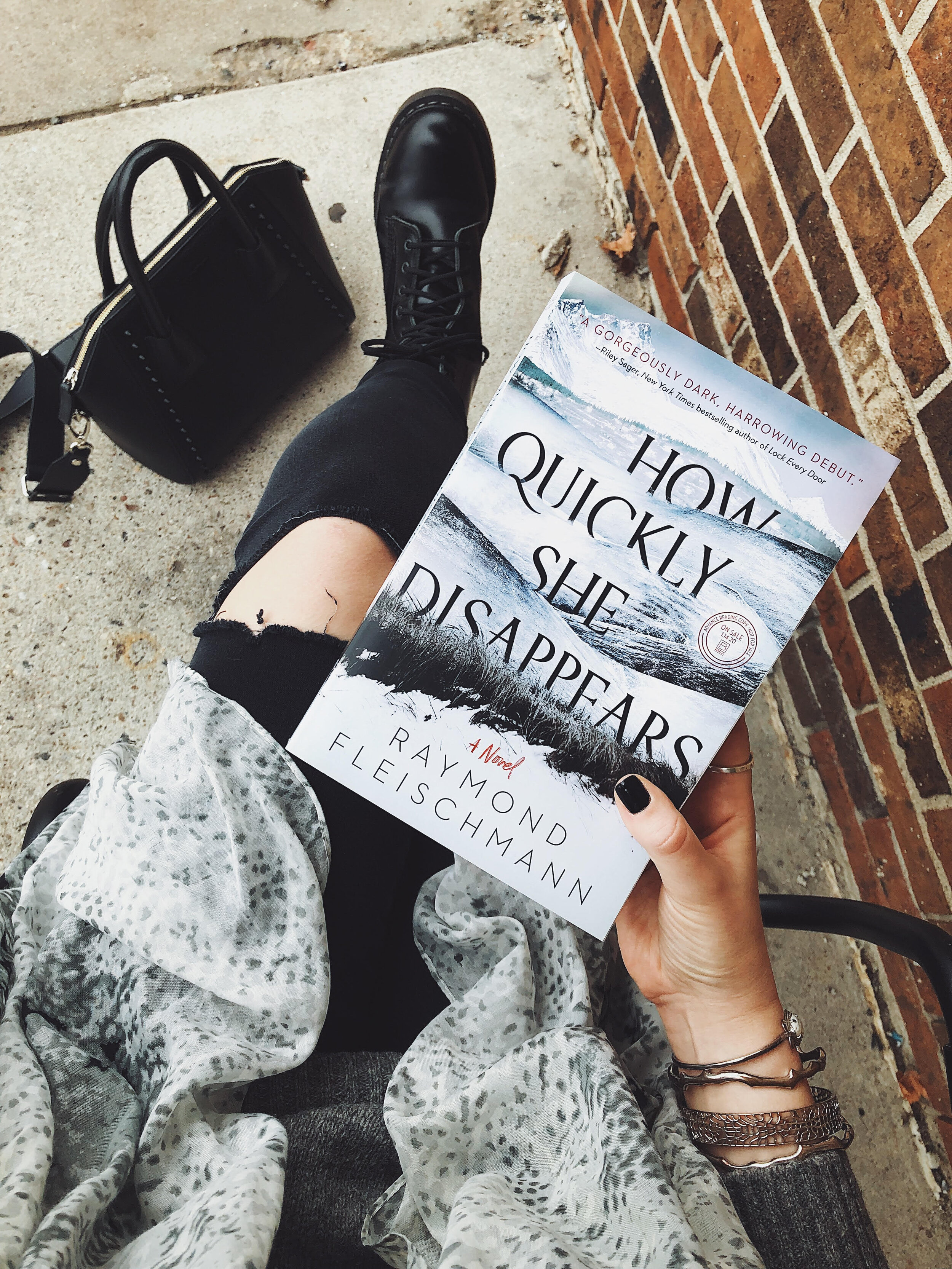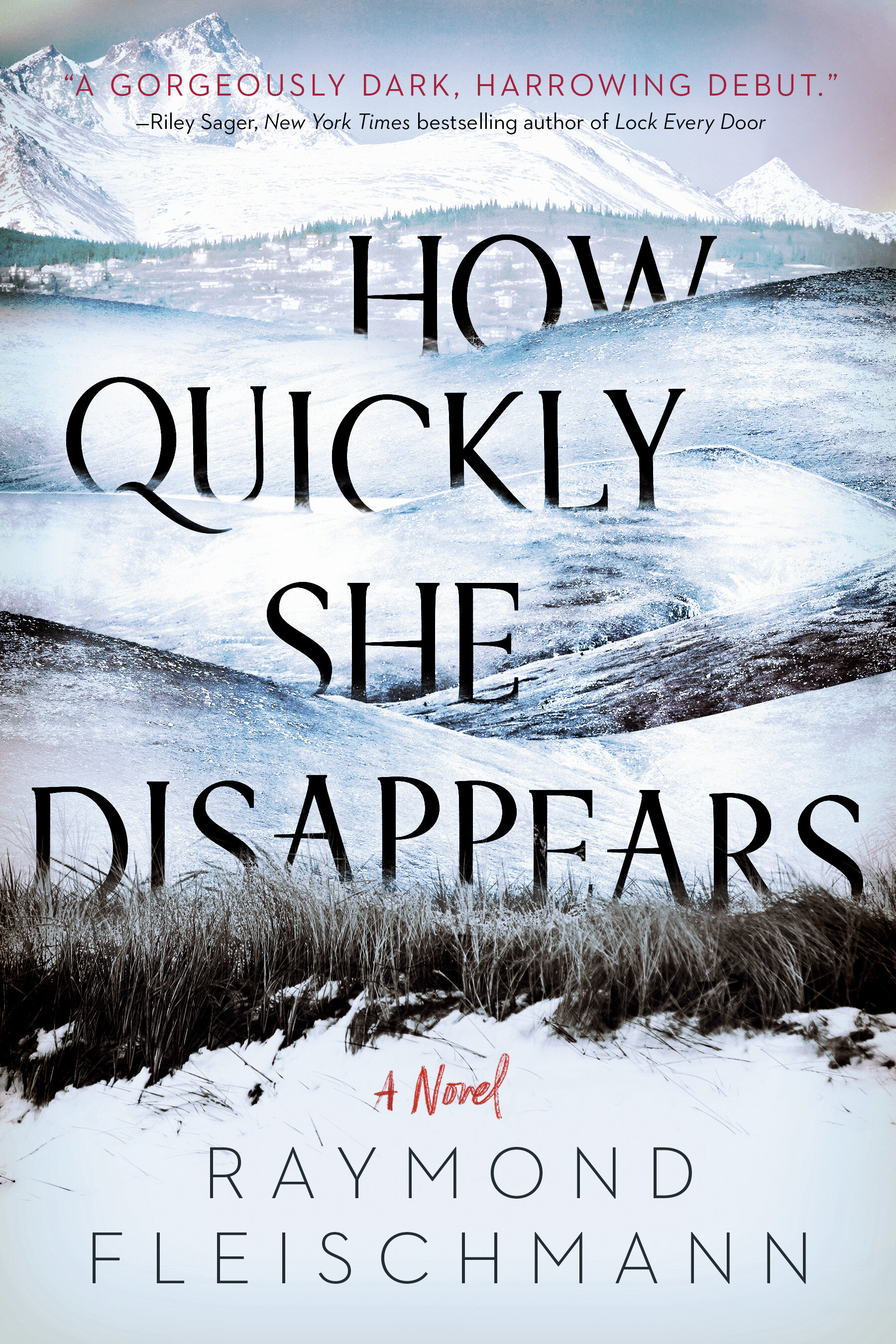How Quickly She Disappears by Raymond Fleischmann
Available January 14, 2020 from Berkley
Some books just scream “read me” from the first moment you learn about them. Raymond Fleischmann’s debut is one such book for me. A literary crime novel being billed as The Dry meets The Silence of the Lambs, and boasting a fantastic praise quote from CBTB-favorite Riley Sager (among tons of additional early praise!), HOW QUICKLY SHE DISAPPEARS looks practically tailor-made for CBTB readers. Thanks to the book’s publisher, I’m thrilled to share a sneak peek into the book with you today!
In HOW QUICKLY SHE DISAPPEARS, a dangerous stranger arrives in a small Alaskan town, bringing with him promises of unraveling a deeply personal mystery for a young woman living there - for a price. This book looks atmospheric, mysterious, and utterly chilling, and I cannot wait to dig in. (I’ll be reading this book this week and sharing updates on Instagram, so be sure to tune in there for my early thoughts!) It’s still a bit of a wait until the book goes on sale in January, but CBTB readers can dig into an early excerpt from HOW QUICKLY SHE DISAPPEARS right here on the blog! Huge thanks to the book’s publisher, Berkley, for providing us with this early sneak peek into what’s sure to be a very buzzy early 2020 release.
Read on to learn more about HOW QUICKLY SHE DISAPPEARS, catch a sample of the incredible early praise the book is receiving, and read an early excerpt from the book!
HOW QUICKLY SHE DISAPPEARS by Raymond Fleischmann
Available January 14, 2020
About the Book:
The Dry meets The Silence of the Lambs in this intoxicating tale of literary suspense, set in the relentless Alaskan landscape, about madness and obsession, loneliness and grief, and the ferocious bonds of family....
My proposition is very simple: I am going to ask you for three gifts, and for each gift you deliver, I will take you one step closer to Jacqueline.
It's been twenty years since Elisabeth’s twin sister, Jacqueline, disappeared without a trace. Now thirty-year-old Elisabeth is living far from home in a small Alaskan town. She's in a loveless marriage and has a precocious young daughter she loves more than anything but who reminds her too much of her long-missing sister.
But then Alfred, a dangerous stranger with a plan of his own, arrives in town and commits an inexplicable act of violence. And he offers a startling revelation: He knows exactly what happened to Elisabeth's sister, but he'll reveal this truth only if she fulfills his three requests.
Increasingly isolated from her neighbors and imprisoned by the bitter cold and her own obsession, Elisabeth can almost hear her sister's voice saying, Come and find me. And so she will, even if it means putting herself—and her family—in danger.
“Raymond Fleischmann has blessed us with the rarest of gifts, a novel paced like a thriller but written with the aching grace of literary fiction. A gorgeously dark, harrowing debut.”— Riley Sager, New York Times bestselling author of Lock Every Door
“Fleischmann has written a riveting and addictive debut. This novel disturbed me and terrified me, and yet I could not turn the pages fast enough. The writing is flawless, the story haunting, and one that will stay with me for a very long time.”—national bestselling author Diane Les Becquets
"Raymond Fleischmann is going to be one of the buzz names for the new year...A beautiful blend of high tension and literary elegance, both deeply moving and immediately engaging.”—Michael Koryta, New York Times bestselling author of How It Happened
“An author to watch on the literary-thriller scene.”—Booklist, starred review
“A masterful psychological thriller that, like the best of the genre, rests squarely on richly developed characters with complicated, sometimes malignant, motivations."—Heather Young, author of the Edgar Award finalist The Lost Girls
"An utterly absorbing period saga—an epic stranger-comes-to-town mystery that reads as intimate as gossip…A graceful, daring, deathless story."—Claire Vaye Watkins, author of Gold Fame Citrus
"Raymond Fleischmann has crafted a novel of the highest suspense…you'll mourn how quickly the pages go by.”—Lee Martin, author of the Pulitzer Prize Finalist The Bright Forever
“Enthralls from the first page to the last. It's both a gripping, cinematic mystery and a powerful exploration of the way that loss and longing tip into obsession.”—Lydia Fitzpatrick, author of Lights All Night Long
"A novel of exquisite suspense—exhilarating as a winter storm, with glittering prose and characters both haunted and haunting. I whirled through this book, and the final chapters left me breathless."—Miciah Bay Gault, author of Goodnight Stranger
About the Author:
Raymond Fleischmann received his MFA from Ohio State University, and he’s earned scholarships and fellowships from Richard Hugo House, the Sewanee Writers’ Conference, and others. He lives in Indiana with his wife and three daughters. How Quickly She Disappears is his first novel.
Excerpt: HOW QUICKLY SHE DISAPPEARS
By Raymond Fleischmann
Twenty minutes had passed since Mr. Glaser arrived, and Elisabeth had every hope that he would already be on his way out of town. He wasn’t airborne yet— she would have heard the plane taking off— but, as she turned the corner and approached the landing strip, she felt certain that she would hear the first catch and clunk of the plane’s engine, and a minute after that Mr. Glaser would be gone.
But when she stepped onto the gravel runway, Elisabeth found that it wasn’t Mr. Glaser who had landed. About two hundred feet down the landing strip stood an unfamiliar plane, its nose slightly crooked, its front left wheel resting in the grass. Equal parts white and canary yellow, the plane resembled most others that Elisabeth had seen in the Alaskan bush, except for one detail: Painted to the left of the propeller was a black‐ and‐ white German Balkenkreuz, which stood out like a mole on the side of someone’s nose. The plane’s wings stretched across the top of the fuselage like a huge rounded paddle and, directly in the center, just above the cockpit’s windshield, a man sat with his knees pulled up against his chest.
For a moment, Elisabeth thought that he was fixing something— tightening a bolt, adjusting a panel, aligning this or that. No matter the season, the conditions in Alaska were tough on planes, and she had seen Mr. Glaser fix such things in the past, sometimes with the help of Teddy Granger, a local who had briefly served as a mechanic in the army.
But this man was just sitting there, motionless, his back turned toward her. He was staring at the trees that lined the landing strip, woods as dense as the cornstalks that had once encircled Elisabeth’s home. He didn’t notice her approaching. A haze of mosquitoes flickered around his head, but he didn’t seem to notice that either.
“Good morning,” Elisabeth said, and she came to a stop a few yards from the plane.
The man jolted, sitting straighter. Then he turned his head and gazed over his shoulder. His eyes were wide and dazed.
“Hello,” he said. “Oh my goodness. Hello.” His voice was a peculiar blend of German and British accents, quick and sharp with the consonants, slow and soft with the vowels. He pushed himself to his feet and stood staring at her from atop his plane. “I’m sorry. I didn’t hear you walking up.” He flashed a nervous smile. “My apologies.”
For the most part, he looked normal enough. Mid‐ forties. Tall and rather slender. He wore a plain white button‐up shirt, brown slacks, black suspenders, knee‐ high boots. He parted his hair to the right with his bangs swept up in a wave, a match for the neat, curving moustache that bent across his face. Elisabeth could tell that he had once been very good‐ looking. He certainly wasn’t ugly in his middle age; it was just that his cheeks and nose were too pointed, too bony, though it was easy to imagine how he might have looked as a softer, younger man. As it was, from his angle high above her, the man owned a certain look of intensity that wasn’t especially inviting. He reminded Elisabeth of a falcon or an eagle. Somehow, even as he smiled, he seemed to scowl.
“I’m sorry I startled you,” Elisabeth said. “No, no,” the man told her. “That’s all right. I’m fine. That’s quite all right.” An awkward second passed between them. Still smiling, the man stared at Elisabeth as if waking from a trance. She wondered if he had been drinking.
“I’m Elisabeth Pfautz,” she said. Cordially, the man bowed his head and lowered his eyes. “Alfred Seidel,” he said. “Very pleased to meet you, Mrs. Pfautz.”
She took a single step forward. “What were you looking at?” Elisabeth turned to the woods, half expecting to see the hulking shadow of a moose or a caribou. But there were only trees— ragged, tired trees— endless as ever. Tanacross was the largest settlement for a hundred miles. Alfred lowered his eyes again, bashfully. “I was just looking at . . .” he began, and paused for a second, “oh, just everything.” He started walking down the spine of the plane.
“Everything?” “Yes, you know,” he said, gesturing with one hand, “all of it. The woods. The bush. All the beautiful world.” He hopped to the ground, facing her now. His eyes were an iridescent shade of blue, and they narrowed at her as he walked a few steps forward. “Did you say your name is Pfautz?”
“I did.” Alfred set his hands on his hips. “You’re a German, then?” “Pfautz is my husband’s name,” Elisabeth said, “but yes, I’m German, at least by stock. My father was from Hamburg, and my mother was from Bremen.”
“Munich,” Alfred said, and he tapped two fingers against his chest. “I’m a German, too.”
“I can see that,” Elisabeth said, motioning at the German cross on his plane. Alfred briefly turned.
“Oh, that,” he said. “You wouldn’t believe how uncomfortable that makes some people. But I have no shame in my heritage, never mind what’s going on now.” He grinned, and his eyes flashed as if they had just shared a secret. “I’m sure you understand,” he said. “As a countryman, I mean. By God, it is good to meet you, Mrs. Pfautz. I’ll tell you: Countrymen are rare up here in the wilds.” And as he said that word— wilds— he puckered his lips as if the word itself tasted foul. Elisabeth shook it off. “What brings you to Tanacross?” “The post office,” Alfred said. He paced back to his plane and unlatched the cabin door.
“Where’s Mr. Glaser?” “In Lincoln, Nebraska.” Alfred leaned inside the cabin and retrieved a single white box of mail, filled only halfway with envelopes and pack‐ ages. He set it on the ground between them. “I fly a route west of Fairbanks, but I’m pitching in for Glaser this week. His daughter is getting married.”
In a flash, it came back to her. Months ago, Mr. Glaser had mentioned his daughter’s coming marriage. He had been unhappy about the location and how far he had to travel. But your little girl getting married only happens once, he had said, and then paused, adding, Or it damn well better.
“Well, it’s good of you to fill in,” Elisabeth said.
Alfred shrugged. “It’s only my job,” he said, but then a shadow seemed to pass across his face, and he rolled his head side to side like a boxer dodging punches. “I do have a favor to ask, however.”
“A favor?” He nodded. “I’ve been flying all day and all night. My route and Glaser’s, you see. I’m exhausted. I need to rest. I need a place to stay, Mrs. Pfautz, and I’ve been told that you have a guest room.” He lowered his chin, and his eyes steadied on hers. “So, if you’d be so kind, I’d like to stay with you.”
A place to sleep. It wasn’t an odd request in itself. Elisabeth and John’s home was the largest in Tanacross: three bedrooms, two fireplaces, a dining room adjacent to the kitchen, and a living room not far from that. And all of this was only one half of the house; the southern half served as the local school, the reason they had come to Tanacross in the first place. Their move was John’s first post with the Office of Indian Affairs. During the past three years, he had helped renovate and update the school, both the building itself and its curriculum. He taught writing, mathematics, and biology, the last of which involved monthly field trips to study the flora and fauna of Glaman Pond, a sickled body of water not far from the house. They had hosted many guests in the past: officials from the Department of the Interior, officers in the army, other teachers on their way to other posts throughout the territory. The third room was meant to be a guest room, particularly for those connected in some way to the government.
But there was something about this man that unsettled her, and there was something strange in the way he had looked at her and spoken to her. He wasn’t inviting himself into her home, and he wasn’t demanding an invitation. He desired it— I’d like to stay with you, he had said— and somehow a desire felt more unnerving than a demand. Elisabeth had no wish to know anything about this man’s desires, and she had no wish to fulfill them.
And yet she felt trapped. The guest room was intended for exactly this type of stay. Even with John out of town, what option did she really have? It was her job— hers and John’ s— to put Alfred up. She felt trapped by obligation, trapped by situation, trapped by a dozen different things at once. But mostly, her eyes locked on him now, she felt trapped by Alfred Seidel.
“The room is free,” she said, hoping that he would hear how this wasn’t the same thing as an outright invitation, “but don’t you have more deliveries to make?” “You’re my last.” Elisabeth shuffled her feet, briefly glancing down. “The room isn’t much,” she said. “It’s not exactly the Ritz. Are you sure you’ll be comfortable?”
He smiled. “I’m always comfortable with my countrymen.” “I see,” Elisabeth said. “Well, you should know that my husband is away on business, so it’s just me and my daughter,” and again she hoped that this would dissuade him, that he would understand her awkward position and all its implicit discomfort.
He didn’t. Alfred smiled merrily, holding up both hands. “That’s fine,” he said. “Countrymen. Countrywomen. I’m sure I’ll feel right at home.” Turning back to his plane, he reached inside the cabin again, this time retrieving a large green duffel bag. He began to close the cabin door, but then he stopped himself. “Oh, I nearly forgot,” he said, and he dropped his bag to the ground. He leaned inside the plane and started digging around a mass of empty boxes and padding blankets.
Elisabeth leaned to the side, trying to sneak a better look. “Do we have another box?” she said.
“Not quite,” Alfred told her, “but I do have a special delivery.” He turned to her and handed Elisabeth a flat package wrapped in brown pa‐ per. A note was affixed to it. For Margaret Pfautz, it read. “Our dear Mr. Glaser set it aside,” Alfred said. He grinned, and again his eyes seemed to flash. “Margaret. Your daughter, I presume? Such a pretty name.”
Excerpted from How Quickly She Disappears by Raymond Fleischmann, published by Berkley, an imprint of Penguin Publishing Group, a division of Penguin Random House, LLC. Copyright © 2020.
Book Details:
Hardcover: 320 pages
Publisher: Berkley (January 14, 2020)
Language: English
ISBN-10: 1984805177
ISBN-13: 978-1984805171
Crime by the Book is a participant in the Amazon Services LLC Associates Program, an affiliate advertising program designed to provide a means for sites to earn advertising fees by advertising and linking to Amazon.com. This in no way affects my opinion of the book(s) included in this post.















Home ownership feel like a distant dream? Zillow listings have you convinced you’ll be renting for the rest of your life? The woman at the heart of Carissa Orlando’s debut The September House feels your pain—and she’s prepared to put up with a lot if it means she and her husband can finally have a place to call their own. In this case, that might just mean living in a house that’s haunted. Playful and irreverent, spine-tingling and spooky, The September House puts a fresh spin on the classic haunted house story, delivering an immersive tale about the secrets lurking within one building’s walls, and within the lives of its inhabitants.